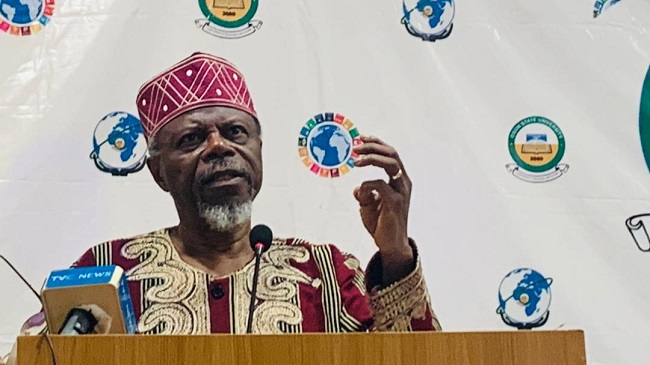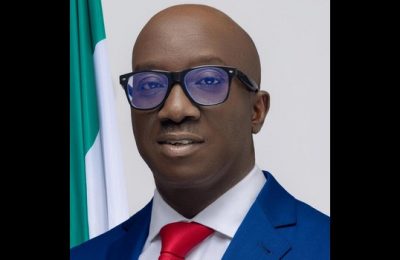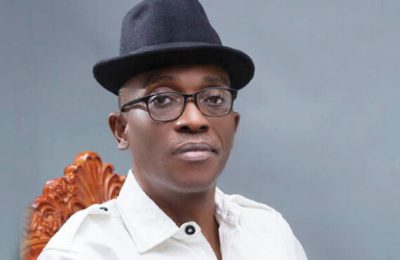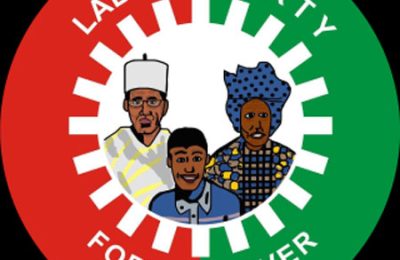A renowned educational icon and outstanding scholar from the University of Texas, Austin, United States of America (USA), Professor Toyin Falola, on Monday agitated for incessant funding of higher institutions saying, this is essential to achieve educational targets.
The university don made the remark at the 4th Prince Tunde Ponnle annual lecture organized to mark his 83rd birthday anniversary held at the Olagunsoye Oyinlola Auditorium, Osun State University, (UNIOSUN) main campus, Osogbo.
Speaking on the theme:” Emerging Issues in the Funding of Higher Education: Lessons from around the World,” argued that a viable higher educational institution is birthed and nurtured into a profitable member of the larger human community.

He however suggested to numerous international organisations to show interest in contributing to the academic dreams of students and get themselves through provisions of funding opportunities for those who merit their grants.
According to him, organisations such as the Fulbright Commission, are somewhat involved in an incredibly profound program of sponsoring the educational ambitions of people across the world and are always paying for the academic services of people.
“They recruit individuals across the world based on the areas of knowledge that they want to impact the students. They bear the financial cost of the programme, and after a specific number of years they renew their contract if needed. As a result of this, one way or the other, the school gets to run their services and students also get enough materials for the academic engagements they are into.”
He further mentioned that, International organisations such as World Health Organisation (WHO), the United Nations, among others, have dedicated significant amounts of money to the funding of students’ education in the United States.

Professor Falola stressed that, “most of these organisations are interested in the education of people from many other countries and would give the privilege to the students who apply for certain courses of study from their home countries. The intention behind the sponsorship is to enrich the countries where students are coming from by encouraging them to be back to their home countries after the end of their educational engagements.”
The academic titan, however, maintained that, “In a nutshell, the whole essence of today’s presentation is to challenge our prior assumptions relating to the seriousness of funding for higher education institutions. Funding is serious. It involves self and institutional discipline. It involves politics at various levels. It utilizes and incorporates the whole community – business, alumni, students, parents, etc. It is in our understanding of this complex phenomenon that a viable higher educational institution is birthed and nurtured into a fruitable and fruiting member of the larger human community.
“You see, whether you belong to the ideology bloc that education is a personal endeavor and that the responsibility of its acquisition and distribution should be personal, or you believe that it is a social good with the society taking up responsibility, one thing is certain: The success of the society is very much dependent on the level of knowledge acquired and the effects therein is both beneficial to individuals and the country. Seeing that we cannot hide away from the interconnectedness of the success of the society and education, no matter the philosophy, the society must ensure that educational institutions are not sapped dry of necessary materials, assistance and funding incidental to fulfilling their societal duty.
“We cannot continue to make excuses for the government and shy away from the cankerworms destroying the fabrics of our educational system. The government must know that if nations look at education from the angle of “costs and profits,” the educational system will continue to deteriorate and if I should recount the effects on the future of this nation, I might be tagged a prophet of doom. Education in a nation like Nigeria is an investment into the future and securing the state of the nation, profits of which may not be immediate. The government must see it as a foundation it cannot compromise as well as hold it as a holy ground that must not be corrupted with mere politicking.
“The government needs to find stable investments whose returns will be used to sponsor education. One does not need to restate the importance of education to the government. It is also necessary to ensure that the government grants a level of autonomy to the universities so as to allow them function properly. Institutions of learning cannot be placed on the same pedestal as other agencies of the government. This must be taken into cognizance in policy and decision making processes that affect educational institutions. The government must also ensure that it does not encroach on the internal affairs of the institutions so as not to replace intellectualism with politics.
“I honestly hope that the government, after recognizing their role as the Prince sponsor of education in the country, make changes, but I must state emphatically that the institutions must now see the government as secondary sponsors in order not to be too stranded. It is important that the diversification processes emerging in our institutions are accelerated to attract more sponsors and investors. However, while the institutions diversify, they must ensure not to forgo their primary objectives. Integrity of the academics must not be compromised no matter what. More so, the universities should not be too desperate that it becomes the evil it is supposed to fight. Excessive levies, fines and charges on students and other stakeholders are not the best approaches to revenue generation.
“In addition, the university system must learn the act of financial prudence and fund management. The situation of the country is fast making intellectuals lose sight of those muses that pushed them to the academia. These days, funds are diverted to other selfish and inappropriate purposes. The cases of universities’ administrations, lecturers and other staffs’ embezzlement and misappropriation of institutional and project funds. Universities must find a way to create a task force or university unit to ensure that funds are expended rightfully and should be able to get financial and status reports of funded projects and grants. Else, the image of the institution will be affected gravely. While we fight the government to fund institutions and seek sponsorship from other institutions, we must as well do equity before we seek equity.
“Duties to ensure securing funds for the institution is not the sole duty of the administrations only but must be a collaborative effort. An average member of the university, including the students and lecturers, need to see the need to take seeking for funds or the institutions their duty. I must commend the effort of the Academic Staff Union of Universities and other Unions in their unflinching endeavors to revitalize the university system. However, it will not be too out of place for the Union to take both active and advisory roles in seeking funds. When the school has all it needs, it is to the benefit of all and sundry.
“Moreso, the Unions need to understand the importance of making sure sanity is maintained in the university environment. In that, the Unions ensure that they do not forget their duty of check and balance. They must ensure that corruption and misappropriation are shunned in the system. With this, investors, even the government, will not have reasons to doubt the maintenance of funds invested or granted the school. University funding is the effort of all and these efforts must be diversified.”
Speaking on the life of the celebrant, Prince Tunde Ponle on his 83rd birthday anniversary, Professor Falola charged all and sundry in the society to emulate his service to humanity by contributing immensely to the rapid growth of the society.
According to him, “The story of Prince Michael Tunde Ponnle is one that typifies altruistic philanthropy developed from honest convictions on good driving notions behind generosity and kindness. He understands life as life taught him lessons through his toils to the top. The fact that his success is built on his admirable doggedness, strategic management, and foresight made him understand why others should be helped in developing those qualities toward success. This is evident upon the face of records of his history and as such could be grounds to assert that his generosity, in whatever way he showed it, is born out of altruism as was his kindness.
“All that has been said so far have been relevant to the personality of Prince Ponnle because of his commitment to educational development in the country. His contribution through the MicCom Foundation for Educational Development is one of the many ways he rose to support education. I am certain that he will also be interested in all that has been said so far.”
In his own remark, the celebrant, Prince Ponnle, appreciated the institution and the invited guests, just as he renewed his commitment to continue funding the indigent in pursuit of their dreams.
“For seven years now, I have been using my allowances to award bursaries to university students and I want to say that these bursaries will not stop. Whatever it takes, I will ensure that this bursary does not stop. Funding education should not be left in the hands of the government and universities alone, as an individual, whatever I have will always be used to advance education in the country.
“We have to contribute to Nigeria’s education; education is very important. Whatever you can contribute to the advancement of education should not be seen as too small,” he concluded.
ALSO READ FROM NIGERIAN TRIBUNE







